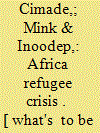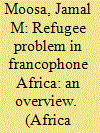| Srl | Item |
| 1 |
ID:
030831


|
|
|
|
|
| Publication |
London, Zed Books Limited, 1984.
|
| Description |
158p.pbk
|
| Standard Number |
086232470X
|
|
|
|
|
|
|
|
|
|
|
|
Copies: C:1/I:0,R:0,Q:0
Circulation
| Accession# | Call# | Current Location | Status | Policy | Location |
| 026841 | 960/CIM 026841 | Main | On Shelf | General | |
|
|
|
|
| 2 |
ID:
054392


|
|
|
| 3 |
ID:
021801


|
|
|
|
|
| Publication |
Spring 2002.
|
| Description |
1-26
|
|
|
|
|
|
|
|
|
|
|
|
|
|
|
|
| 4 |
ID:
051894


|
|
|
|
|
| Publication |
April 2004.
|
| Summary/Abstract |
In most academic literature refugees are portrayed either as those who lack what national citizens have or as a threat to the national order of things. This article explores the effects of being excluded in such a way, and argues that Burundian refugees in a camp in northwest Tanzania find themselves in an ambiguous position, being excluded from the national order of things - secluded in the Tanzanian bush - while simultaneously being subject to state-of-the-art humanitarian interventions - apparently bringing them closer to the international community.
The article explores the ways in which refugees in the camp relate to the international community. Ambiguous perceptions of the international community are expressed in rumours and conspiracy theories. These conspiracy theories create a kind of ontological surety by presenting the Hutu refugees as the victims of a grand Tutsi plot supported by 'the big nations'. Finally, the article argues that refugees - being excluded from the nation-state and being subject to the government of international NGOs - seek recognition from the international community rather than any nation-state. This does not, however, destabilize the hegemony of the nation-state, as refugees perceive their own position as temporary and the international community as the guarantor of a more just international order in the long run.
|
|
|
|
|
|
|
|
|
|
|
|
|
|
|
|